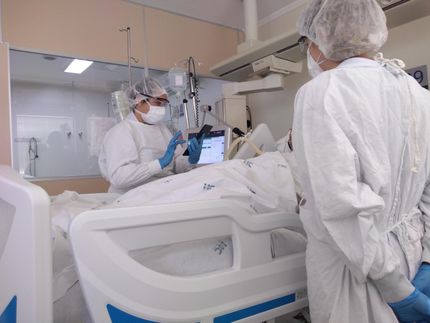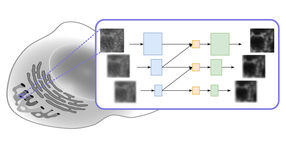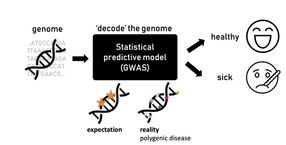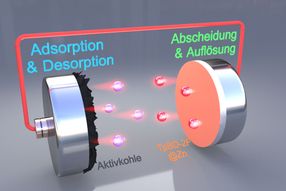Neutron beams reveal how antibodies cluster in solution
Scientists have used small-angle neutron scattering (SANS) and neutron spin-echo (NSE) techniques for the first time to understand how monoclonal antibodies (mAbs), a class of targeted biopharmaceuticals used to treat autoimmune disorders and cancer, dynamically cluster and move in high concentration solutions. Certain mAb cluster arrangements can thicken pharmaceutical solutions; they could thus limit the feasible concentration of injectables administered to patients around the world. The insights provided by a team of neutron scientists from the National Center of Neutron Research (NCNR) and the Institut Laue-Langevin (ILL), in collaboration with colloid and proteins scientists at the University of Delaware and biopharmaceutical company Genentech (a member of the Roche group), are an important step towards the development and manufacture of high-concentration biopharmaceuticals needed for high-dose indications and potential self-administration at home.
Monoclonal antibodies (mAbs) are proving to be a vital tool in modern pharmacology, providing the basis for a growing number of successful drugs for cancer and autoimmune disorders such as arthritis and multiple sclerosis. As agents for targeted therapy with a good safety profile, they are an alternative to harsher chemotherapy treatment.
The mAbs work by attaching themselves to specific protein targets on cancerous cells, or blocking target proteins in a known biochemical pathway responsible for a disease. These treatments usually require high doses, and lately in some indications there has been considerable interest in moving from intravenous (IV) delivery to a more convenient subcutaneous (SC) delivery - a shallow injection into the cutis just below the skin (such as the home treatments offered to sufferers of type 1 diabetes). However, progress has been hampered by the high viscosity of solutions containing high amounts of mAbs, and this provides challenges to efficient and economical large-scale production, purification, and delivery of these drugs.
"For some proteins at concentrations higher than 100 mg/ml, you can't deliver them fast enough through thin, SC injection needles, so repeat visits to the hospital with intravenous drips are needed," explains Prof. Yun Liu from the National Center of Neutron Research (NCNR) in the US, who is also affiliated with the University of Delaware. "The thickening may also cause problems in processing, when filtration pressures are too high, for example, or during freeze and thaw in large tanks where potential gelation or phase separation of the freeze concentrate can occur."
As a result, efforts to find ways to raise the concentration of monoclonal antibody pharmaceuticals are focused on understanding the root cause of this thickening. Previous studies using static light scattering (Lilyestrom et al, 2013) on concentrated mAb solutions had suggested a strong link between the development of protein clustering formations and increases in viscosity.
Other news from the department science
Most read news
More news from our other portals
See the theme worlds for related content
Topic world Antibodies
Antibodies are specialized molecules of our immune system that can specifically recognize and neutralize pathogens or foreign substances. Antibody research in biotech and pharma has recognized this natural defense potential and is working intensively to make it therapeutically useful. From monoclonal antibodies used against cancer or autoimmune diseases to antibody-drug conjugates that specifically transport drugs to disease cells - the possibilities are enormous

Topic world Antibodies
Antibodies are specialized molecules of our immune system that can specifically recognize and neutralize pathogens or foreign substances. Antibody research in biotech and pharma has recognized this natural defense potential and is working intensively to make it therapeutically useful. From monoclonal antibodies used against cancer or autoimmune diseases to antibody-drug conjugates that specifically transport drugs to disease cells - the possibilities are enormous























































